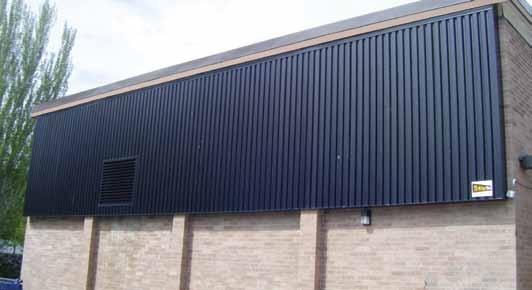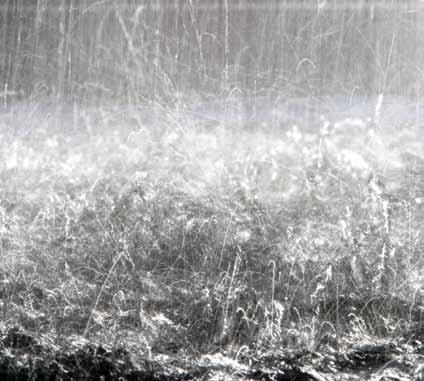
7 minute read
Rocky Point Engineering and EFMA: A mutually beneficial partnership
The RPE team at our booth for the Star Wars theme night at EFMA’s 2013 Conference and Trade Show. From left to right: Cory Langevin, Sarah Goddard, Richard Corra, Bobbie Green, Emmanuel Lavoie, Barb McNicholls, and Stephen McNicholls.
2014 will be the 13th consecutive year that Rocky Point Engineering Ltd. (RPE) has been an exhibitor at the annual EFMA Conference and Trade Show in Penticton. That’s almost as long as our company has been operating! Since establishing the company in 1997, our mechanical engineering firm has been providing quality design and services to diversified clients in the public and private sectors, including the education, healthcare, civic/government, commercial, data centre, senior/social housing, hospitality and recreation markets.
All along, the K-12 education sector has been a core part of RPE’s business and our involvement with EFMA is a big reason why this is so. Prior to our first year at EFMA in 2002, our school district client list consisted of eight districts. At the time, we had provided services to the Nanaimo, Alberni, Comox Valley, Vancouver Island West, Howe Sound (now Sea-to-Sky), West Vancouver, Haida Gwaii and Coast Mountain school districts.
Fast-forward to 2014 and we have now worked with 51 districts across the province, including 45 districts in the past two years alone. British Columbia’s K-12 school districts have, to a large degree, fostered the growth of our firm. At the end of 2009, Rocky Point consisted of two offices, in Nanaimo and Langley, with a combined total of 15 employees. Today, we have added offices in Vancouver, Victoria, Kelowna, Kamloops and Nelson—a total of seven offices in B.C., with 64 employees.
We employ 11 professional engineers, six engineers-in-training (EITs) and 14 technology graduates from B.C. Technology schools, with 16 of our senior staff being LEED®-accredited professionals. Of our 11 principals, eight worked together at Keen Engineering Co. Ltd. between the 1970s and 1990s, so our leadership group goes back a long way together and shares common core values about how to successfully operate our business.
RPE has completed a significant number of complex school projects, from small additions and full-size elementary, middle and secondary schools to HVAC upgrades, boiler upgrades, dustcollection system upgrades, solar-wall installations and DDC system upgrades. We have always striven to ensure the mechanical and plumbing systems associated with these designs include current best practices and we are constantly
Project: Ballanes Secondary School, Parksville. Client: SD #69 (Qualicum). Description: Condensing boilers.

updating our standards and finding ways to improve our designs. Our design philosophy has always been: “If the designs are simple, they will be easy-to-maintain, easy-to-operate and will have a better
Project: Merritt Central Elementary, Merritt. Client: SD #58 (Nicola-Similkameen). Description: Solar wall.

chance of operating at a high level of efficiency.”
A large proportion of our recent work has been strongly focused on sustainable design, utilizing energy- and resource-reduction strategies. We have been involved with a number of LEED education-sector projects, including: • Acadia Elementary, Vancouver (LEED
Gold pending) • Sunnyside Elementary, Surrey (LEED
Gold pending) • South East Yorkson Elementary, Langley (LEED Gold pending) • James Park Elementary, Coquitlam (LEED Gold pending) • Lynn Fripps Elementary, Langley (LEED Gold pending) • Westview Elementary, Powell River (LEED Gold pending) • Centennial Secondary, Coquitlam (LEED Gold pending) • Royal Bay Secondary School (currently under design; targeted for LEED Gold)
In working with our school district clients, we have identified some of the core challenges currently facing school districts and developed solutions to these issues.
Challenge: reducInG operatIonal costs
Solution: Improving equipment and operating efficiency to reduce energy consumption, utility bills and the carbon footprint can be achieved with installation of condensing boiler plants, air source heat pumps, ground source heat pumps, active chilled beams, radiant floors, solar walls, heat recovery strategies and instantaneous domestic hot water heaters.
RPE has engineered and overseen installation of more than 250 school heating plant upgrades
Challenge: Indoor aIr qualIty Issues
Solution: Most older schools do not provide fresh air ventilation that is compliant to current code requirements. While never initially ruling out any po-
THERE’S A TIME TO COMPARE ROOF GUARANTEES & THE COVERAGE THEY OFFER

THERE’S ALSO A TIME WHEN IT’S TOO LATE TO DO SO
There are consequences to choosing badly. Saying yes to the RoofStar Guarantee means peace of mind knowing your investment is backed by the best in the industry. You’ll access the best materials, the most reliable contractors & installers—and you’ll have an independent, 3rd party inspector on your team: someone who will monitor the installation process and work on your behalf to ensure things are done right from square one. And that means one less thing to worry about when the storm hits. Roofing: It’s what we do.
rcabc.org | roofstar.ca
Project: Rock City Elementary HVAC Upgrade, Nanaimo. Client: SD #68 (Nanaimo-Ladysmith). Description: Unit ventilator with oval duct.

tential solution, we have found modular ventilation equipment is often best suited to retrofit in an existing school, where space for large ductwork associated with central-air handling units often cannot be coordinated with building structure. Unit ventilators and package heat pumps, for example, eliminate the need for large trunk ducts. Also, in conjunction with carbon dioxide and occupancy sensors and a digital controls interface, modular equipment can be operated to minimize introduction of outdoor air, slow down fan speed or even shut off entirely on a classroom-by-classroom basis where occupancy is sporadic.
RPE has engineered and overseen installation of over 200 school ventilation upgrades.
Challenge: reducInG MaIntenance eFForts
Solution: Simply upgrading to any new HVAC or plumbing equipment will, by definition, reduce maintenance requirements by replacing older or wornout equipment.
Challenge: Hvac equIpMent coMplaInts, sucH as poor teMperature control, draFty condItIons or noIse
Solution: There can be low-cost improvements made by following BC Hydro’s Continuous Optimization Program (or a program of similar standards), where a review of the control’s device functionality and programming often turns up unintended or improper operation of HVAC equipment. Unnecessary wear-and-tear and use of energy can be remediated in many instances using very low-cost measures requiring only DDC reprogramming and/or replacement of a few faulty control devices.
Solution: Providing rebalancing, recommissioning and verification that equipment is actually operating as intended and that controls are providing the temperature control required. Simply put, if the systems aren’t properly calibrated, they won’t work properly.
RPE has in-house balancing and commissioning staff to offer the value-added service of ensuring mechanical systems we have designed, or those that have been in operation for years, are correctly “calibrated”.
Solution: Over the past few years, submission of reports by school districts in support of requests for capital has become a detailed and somewhat complex exercise. For mechanical upgrades as part of capital plan submissions, a MEUP report (Mechanical and Energy Upgrade Program) is required. Carbon Neutral Capital Plan (CNCP) reports and in the past, PSECA reports, have all focused
Project: Central Middle School, Victoria. Client: SD #61 (Victoria). Description: Recirculating wood dust extraction system.

on specific reporting requirements that include documentation of age and construction of the school; description of in-situ mechanical infrastructure and an explanation of why it should be considered for replacement; description of proposed remedial measures; capital cost estimate and projected energy; and carbon footprint reductions requiring some energy modelling.
RPE has authored more than 300 MEUP, CNCP and PSECA reports for British Columbia school districts since 2010.
In closing, we want to stress that involvement with EFMA has been of great benefit to Rocky Point Engineering, and we hope of similar benefit to EFMA and school districts across the province of B.C. Much of our growth from inception until present day can be accredited to our participation in the K-12 sector, which to a large degree is due to our participation in EFMA.
Year after year, we set up camp in the southwest corner of the showroom (our “Rocky Point Corner”) and have the pleasure of catching up with our established friends and colleagues, as well as making new introductions to school district facilitators and maintenance operators. We are thrilled to be celebrating EFMA’s 50-year anniversary and look forward to many continued years of attendance at the annual EFMA Conference and Trade Show. b










